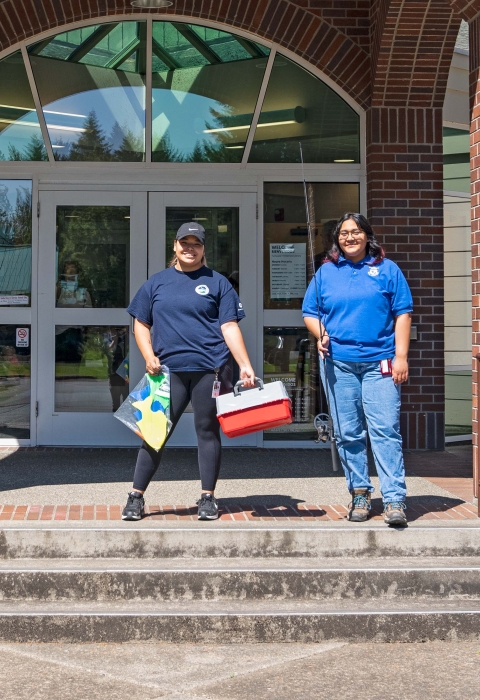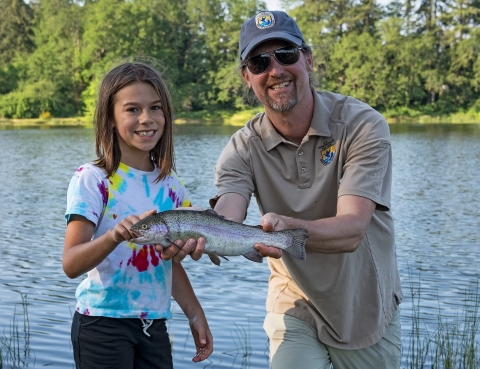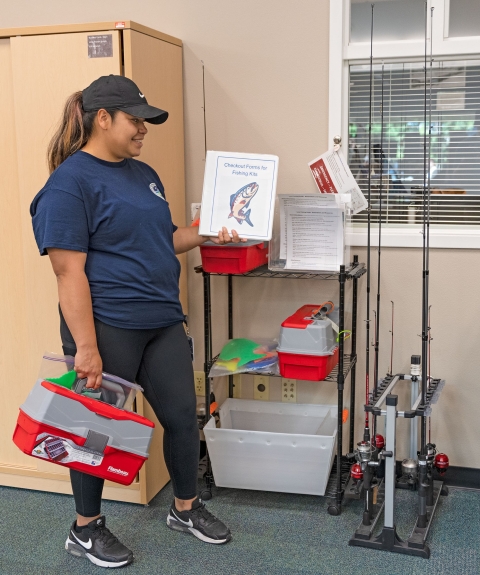By Kevin Cody, U.S. Fish and Wildlife Service Intern through the American Conservation Experience
For many of us, some of the first connections to nature came from fishing as kids. From the first big fish to time spent with loved ones by the water, the memories stick with you and can spark future gateways into career paths, areas of study, and a lifelong love for the outdoors.
Unfortunately, not everyone has those opportunities due to some form of a barrier, such as the rising cost of equipment or simply not having access to the knowledge on how to get started. This is where the U.S. Fish & Wildlife Service’s (Service) Western Washington Fish and Wildlife Conservation Office and their partners come in. Together, they are providing opportunities for all to become future anglers and stewards of the environment.
Two of the most successful outreach programs on this front have been fishing events with Big Brothers Big Sisters of Southwest Washington and the Library Fishing Tackle Loaner Program, which continues to expand to meet the high demand from the public. Both programs are supported with funding from Friends of Northwest Hatcheries and the Service’s Fish and Aquatic Conservation “Fish Funds” Program. The Fish Funds were established to further opportunities for participation in outdoor activities like hunting, fishing, hiking, and birding to connect people with nature and empower the next generation of conservationists.
Big Brother Big Sisters
Big Brothers Big Sisters, Rods and Reels in Need, and the Service teamed up to host a fishing event on May 25, 2023, at Woodland Creek Community Park in Lacey, Washington. For the third year in a row, this event made a significant impact on all who attended.
“Big Brothers Big Sisters of Southwest Washington is honored to partner with the U.S. Fish & Wildlife Service and Rods and Reels in Need for this annual event (year 3). It has been so great to introduce fishing to the next generation. Many of our youth spend limited time outdoors, so we love to feature activities that will help them connect and explore their natural environment. Fishing is also an excellent bonding activity for our Bigs and Littles,” said Moriah Candler, program director for Big Brothers Big Sisters of Southwest Washington.
Some participants had been to one of the previous events and were excited to talk about their fishing adventures since then. There were also several new faces excited to try fishing and learn about the importance of aquatic ecosystems.
“Logan came to our first fishing activity in 2021. He had never fished before and was hesitant to try. After getting his rod and reel set up, he was able to catch a fish on his first day. Logan was so excited that he went home to his mom and asked her when they could go again,” said Candler. “Now his family has gone many times. He attended again this year and was excited to bring his fishing pole and tackle box to show us his setup and get fishing once again.”
The first step for the Bigs and Littles was to head over to the casting station, where an activity was set up to help them learn the basics of that skill. This station, which was run by Service interns, also included a fish identification. This activity celebrated the intrinsic value of learning about fish species while also stressing the importance of being a good steward by following the regulations specific to different species of fish. Some species found in western Washington such as bull trout, for example, are listed as threatened under the Endangered Species Act. Participants learned not to target those species and to carefully release them if caught by accident.
After gaining experience at the casting and fish identification learning station, the Bigs and Littles picked up their brand-new fishing rods and tackle box filled with everything from bait to lures. Next to that was the knot-tying station where they were taught basic knot tying, such as the ever-useful clinch knot, by Larry Stamp, founder of Rods and Reels in Need.
In addition to learning basic knot-tying skills, Larry also guided the Bigs and Littles through how to set up their own rods for bait fishing. A big goal of the program was preparing both Bigs and Littles to become self-sufficient anglers so they can continue to enjoy the gear independently. The participants then headed down to Longs Pond, where they could try their hand at catching rainbow trout.
The fish were biting that day, with many of the kids catching several large rainbow trout. While many fish caught were good sized trout, 8-year-old Bella took home the biggest catch.
“It was so fun! It was a good time to enjoy myself. It was exciting catching the biggest fish of the day,” said Bella.
Passing on the fun of fishing to a new generation is a core mission for the event – though teaching kids about aquatic ecosystems and helping them get excited about nature is equally important.
While teaching how to clean fish and prepare their catch to take home, Dan Spencer, information and education specialist and angling programming director for the Service’s Western Washington Fish and Wildlife Conservation Office, gave the kids an anatomy lesson and some interesting facts about rainbow trout.
"While fishing is a natural gateway to enjoying, connecting with, and appreciating nature, it's also an excellent opportunity to promote eco-literacy. We aim to weave in as much science and stewardship as possible with this sport, including covering water quality, aquatic food webs, invasive species invasive species
An invasive species is any plant or animal that has spread or been introduced into a new area where they are, or could, cause harm to the environment, economy, or human, animal, or plant health. Their unwelcome presence can destroy ecosystems and cost millions of dollars.
Learn more about invasive species , and fish identification and anatomy. The fish dissections, in particular, elicit the most awe-inspiring responses from our programming participants, and I feed off their enthusiasm and wonder," said Spencer.
Library Fishing Tackle Loaner Program:
In-person programming can only reach a limited number of people. The Library Fishing Tackle Loaner Program provides opportunities for individuals and families who cannot attend such event in-person. Since its launch in April 2021, the library program has been a great success, growing from a single location at its launch to five. The Tumwater Timberland Library has experienced such high demand that the number of available kits is now increasing, allowing even more families to have the opportunity to go fishing without the potential barrier of the cost of equipment.
“Several of our patrons have commented on how unique it is for a library to carry fishing kits. Comments like, ‘I've never heard of a library checking out fishing kits,’ and, ‘Wow, you carry fishing kits?’ I also talked to one family recently who took one of our kits on a fishing trip. Though they didn't catch anything, the time they spent outdoors together was precious and fulfilling,” said library assistant Chris Jordan.
The fishing kits also serve as a gateway for anyone wanting to try angling for the first time. In addition to the kits is a complete reference guide to everything in the tackle box, an essential fishing skills guide, a local fishing access guide, and where to find fishing license information. There is also a link to instructional videos produced by the Service with tutorials on fishing fundamentals such as knot tying and casting.
This programming is also expanding beyond the Western Washington Fish and Wildlife Conservation Office facility. Spencer has been providing technical support for other facilities throughout the country to develop and implement their own library fishing tackle loaner programs. This includes the Leavenworth National Fish Hatchery, which will be setting up two libraries with kits this summer.
"Removing barriers to participating in outdoor activities is a big Service priority. This work is also personal to me,” said Spencer. “My passion for fishing and nature motivated me to pursue a career in conservation science despite my struggles with school, and it opened more pathways than I can count. I was very fortunate to have had those opportunities, so paying it forward through efforts like the Library Fishing Tackle Loaner Program and Big Brothers Big Sisters events is important, meaningful, and fulfilling."
Editors Note: Special thanks to the U.S. Fish and Wildlife Service Retirees Association and to Rods and Reels in Need. This programming would not be possible without their funding and gear support.








